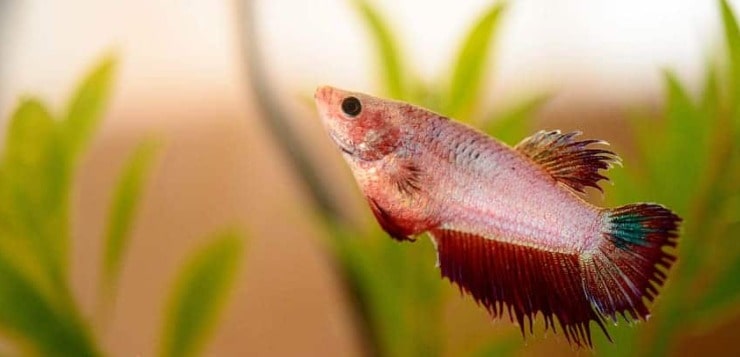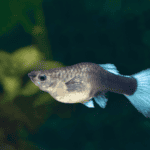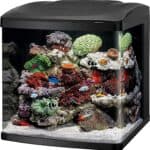If you have a betta fish and it has a big belly, don’t worry! In this post, we will teach you the most common reasons why your betta fish has a big belly. We’ll also teach you what to do about it and how to prevent your betta fish from having a big belly. Let’s get started!
Why Does My Betta Fish Have A Big Belly?
Your betta has a big belly because it has been fed too much, is suffering from dropsy, or is currently pregnant. These are all common reasons why your betta fish has a big belly.
Luckily, there are things you can do to reduce the size of your betta’s stomach and get it back in shape! The key is to first discover the exact reason why your betta’s stomach is enlarged.
Once you know the reason, you can take appropriate action to help your fish get healthy again. Let us take a look at each reason one by one.
1. Your Betta Is Overfed
If your fish eats too much food, its stomach can’t fit all the nutrients and will start to expand in size! This makes sense, right? If you stuff yourself with watermelon at Thanksgiving dinner, do you feel bloated afterward? That’s exactly what happens when your betta eats too much.
Your betta may even be fat! Regularly giving too much food can lead to obesity, just like with humans. Not only is this unhealthy for your betta, but it can also be dangerous.
The easiest way to prevent your betta from becoming overfed is to only feed it a small amount of food twice a day. This will help its stomach digest the food properly and reduce the chances of bloating.
Once you know the correct amount of food to give your betta, make a schedule or routine and stick to it! This removes any chance of you accidentally feeding your betta twice in the same morning.
Is My Betta Constipated From Too Much Food?
If your betta is overfed, the food may stay in its stomach for too long. This can cause constipation and bloat! Betta fish are carnivorous predators, which means they eat meat-based foods, like bloodworms and brine shrimp.
Their stomachs are TINY! In fact, they are only about the size of their eye, which means they will become constipated if they eat too much food. This is why it’s so important to only feed your betta small amounts of food twice a day, as mentioned above.
It’s important that you don’t give your betta much plant-based food, like algae wafers or cucumbers. These types of food can actually cause constipation in your betta fish.
If you think your betta is constipated from the wrong type of food, you should try feeding it a small number of live bloodworms instead of hard foods. Live bloodworms are more digestible and will help your betta fish pass any constipation it might have.
2. Suffering From Dropsy
Dropsy is a failure of the betta’s organs. As such, this is a lot more serious issue when compared with overfeeding. This condition can be caused by a variety of factors, including the betta not being fed properly, poor water quality, and swim bladder disorder.
When your betta is suffering from dropsy, it may also have extremely swollen eyes, scales on its body that may start to protrude outwardly, clamped fins, and lethargic movement.
The bad news is that dropsy is nearly always untreatable! This means that even if you start acting quickly, your betta may have a serious condition that will eventually cause it to die.
One way to make sure your betta doesn’t get dropsy is to keep its living environment clean and properly maintained. You should do a thorough water change at least once every two weeks, removing any leftover food or bacteria-filled waste in the process.
Does My Betta Have Dropsy or Is It Bloated?
If your betta is just bloated, then you won’t see any of the other symptoms associated with dropsy. However, betta fish with dropsy will always exhibit at least one of the other symptoms.
Look for loss of color, elongated fins, protruding scales, and lethargic behavior. This will help you determine if your betta fish has a serious condition or not.
If you’re not sure whether your betta has dropsy or is simply bloated, ask a vet for an accurate diagnosis. This is the only way to be absolutely certain and start treatment if necessary.
3. Your Female Betta Is Pregant
If your betta is female, there is a good chance that it is pregnant! Female bettas can store sperm inside their bodies for up to six months, so it’s not unusual for them to become pregnant long after you think they have been bred.
If you believe your betta may be pregnant, the best thing to do is to keep it in a separate tank. A female betta that is pregnant will often become very defensive and can attack other fish in the aquarium, even if they are its own offspring!
Is My Betta Pregnant or Bloated?
If you have a female betta and it suddenly becomes bloated, you could have a pregnant fish on your hands!
You should look for the main signs of betta pregnancy, which are a distended belly, breeding stripes (vertical stripes that are white in color), and a dark spot near the anal fin. These signs will not only tell you that your betta is pregnant, but will also help you determine how far along it is in the pregnancy process.
Conclusion
To sum up this article, there are several reasons why your betta may have a big belly. It could be bloated, it might have dropsy, or perhaps even pregnant!
No matter the cause of this symptom, you should always keep up with proper feeding routines and water changes to ensure that your fish stays healthy for many years to come.
If you’re not sure whether your betta has dropsy or is simply bloated, ask a vet for an accurate diagnosis. This is the only way to be absolutely certain and start treatment if necessary.
I hope this article has helped you to better understand the possible causes of a bloated betta fish. Thanks for reading!






